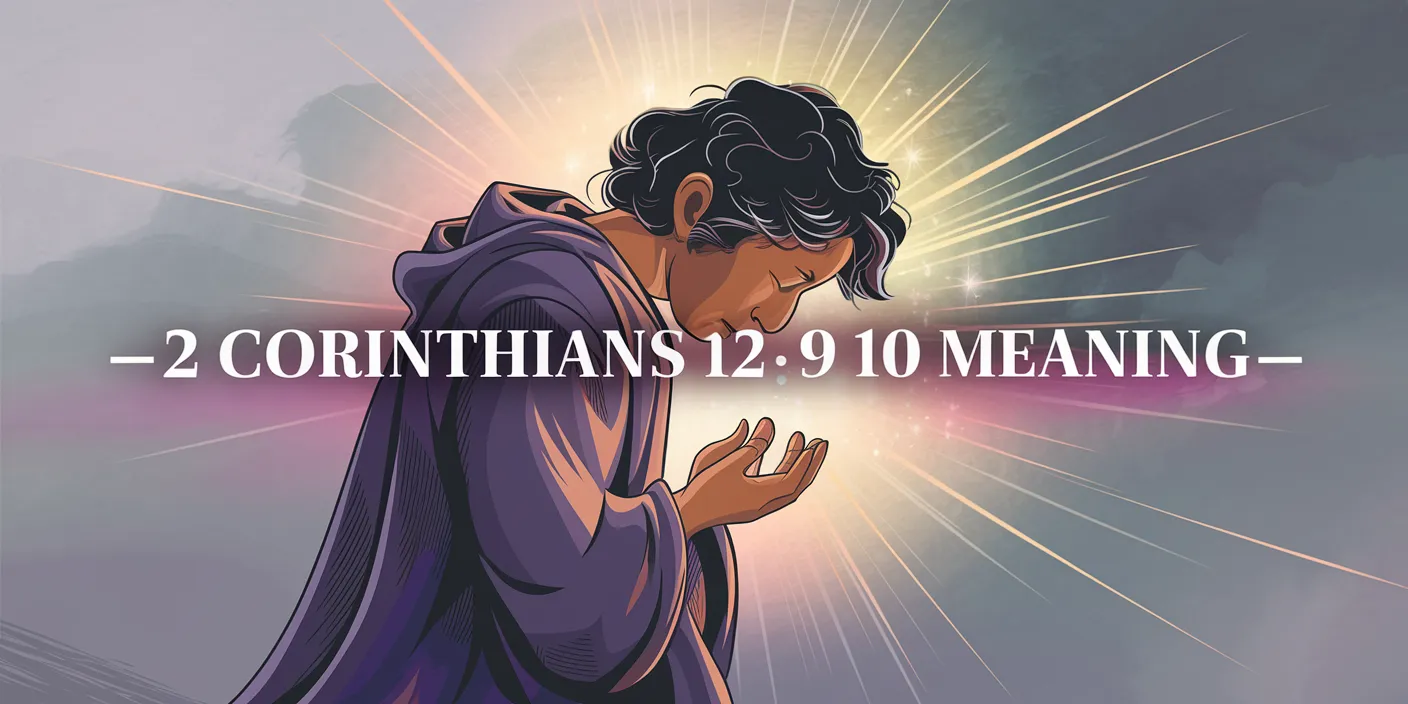The 2 corinthians 12 9 10 meaning provides some of the most paradoxical yet deeply comforting scripture in the Christian tradition. These verses contain a counter-cultural message: that in a world where autonomy, self-sufficiency and outward success are idolized, “true strength” is not found in spite of weakness, but rather through it, fully enabled by the grace of God. Written by the apostle Paul, this passage comes from a deeply personal struggle. Yet, it’s message has been resonating for centuries, providing hope and perspective to believers enduring all manners of trials. In this article, I attempt to weave together the rich and diverse strands of thought and context that shape and provide meaning to 2 Corinthians 12: 9-10 and track its relevance and guiding wisdom for the intricate dance of faith and human vulnerability in today’s world.
Understanding the Context: Paul’s Thorn and Plea

We must first consider the background against which the 2 corinthians 12 9 10 meaning was penned before we can really appreciate it. Paul defending his apostleship against detractors is speaking to the Corinthian church. He grudgingly talks of great spiritual experiences, including being swept up to the “third heaven,” just before this chapter (2 Corinthians 12:2–4). But Paul soon veers from these grand discoveries to something far more humble: a recurring affliction he names as a “thorn in the flesh” (2 Corinthians 12:7).
The Mysterious “Thorn in the Flesh”
This “thorn” specifically was what exactly? Scholars have argued for millennia about several possibilities:
- Physical ailments (eye problems, malaria, epilepsy, speech impediment)
- Intense spiritual opposition or temptation
- Psychological struggles or anguish
- Persistent persecution from opponents
Although Paul doesn’t say it clearly, the particular type of the thorn is fascinating. maybe the uncertainty is deliberate. Leaving it vague makes the “thorn” a universal emblem for any kind of ongoing suffering, struggle, constraint, or vulnerability that Christians could go through, bodily, psychological, spiritual, or relational. The main issue is Paul’s reaction to the thorn and, more significantly, God’s reaction to Paul. It is not the what of the thorn.
Paul’s Prayer and God’s Counterintuitive Answer
Paul prayed sincerely for its eradication, as any person of faith would have done faced with this ongoing affliction. In 2 Corinthians 12:8 he says, “Three times I pleaded with the Lord about this, that it should leave me”. His expectation was probably of deliverance from the weakness. But God responded with transformation by divine sufficiency rather than elimination. This prepares the audience for the important lines 9 and 10, which expose the core of the 2 corinthians meaning.
Unpacking the Core Message: Grace is Sufficient
The essential theological gem of God’s answer to Paul’s plea is “But he said to me, ‘My grace is sufficient for you, for my power is made perfect in weakness.'” Two Corinthians 12:9a. Let us dissect this great comment.
The All-Encompassing Nature of God’s Grace
In this regard, what is “grace”? Greek: charis? Though it involves such, it’s more than just undeserved favor or pardon. Here, grace marks God’s active, enabling power and heavenly help given to Paul amid his suffering. God’s extraordinary strength, perseverance, and sufficiency enable Paul not only to negotiate the thorn but also to flourish spiritually despite it. God was not guaranteeing a life free from suffering; rather, His constant presence and power within it. There is enough grace; it is exactly enough for the need, missing nothing.
Power Perfected in Weakness: The Divine Paradox
The second clause, “for my power is made perfect in weakness,” reveals a stunning paradox. Human logic dictates that power masks or eliminates weakness. God’s economy, however, operates differently. His divine power (Greek: dynamis) doesn’t just operate alongside weakness; it reaches its intended fullness, its perfection, its completion in the very place of human frailty and inadequacy.
Think of it like this: When we are strong in ourselves, relying on our own talents, resources, and resilience, we leave little room for God’s power to be evident. We might achieve things, but the glory often defaults to us. However, when we reach the end of our own strength, when our limitations are undeniable, when we are acutely aware of our need – that is the precise condition where God’s dynamis can flow most freely and be most clearly recognized as His work, not ours. Our emptiness becomes the vessel for His fullness. Recognizing this counterintuitive truth is essential to understanding the 2 corinthians 12 9 10 meaning.
Embracing Weakness: Paul’s Transformed Perspective
The response of God significantly changed Paul’s viewpoint. He started to perceive his weakness as the very field where God’s strength was most active and obvious, not as a liability or a sign of divine discontent. This results in his startling proclamation in the rest of verse 9 and verse 10.
Boasting Gladly in Weaknesses
“Therefore I will boast all the more gladly of my weaknesses, so that the power of Christ may rest upon me,” Paul says. Two Corinthians 12:9b. This is quite radical. Usually, Boasting is focused on strengths, successes, or reputation. Paul runs the entire script backwards. He finds cause to “boast gladly” in the possibility his shortcomings offer for Christ’s power to be shown through him, not in the suffering itself (masochistically). The Greek term “rest upon” or “dwell in” (episkenoo) denotes the Shekinah glory of God abiding in the Tabernacle — Paul sees his own feeble human life as the site where Christ’s might chooses to reside.
Contentment Amidst Hardship: For Christ’s Sake
Verse 10 explores this acceptance of difficulty: “For the love of Christ, then, I am satisfied with weaknesses, insults, difficulties, persecutions, and disasters. For then I am strong when I am weak.” (2 Corinthians 12:10). Paul names several kinds of suffering and professes contentment (eudokeo – finding satisfaction, taking pleasure) in them, especially “for the sake of Christ.”
- Weaknesses (astheneiais): General term for lack of strength, covering physical, emotional, or spiritual frailty (including the “thorn”).
- Insults (hybresin): Verbal abuse, mistreatment, attempts to shame or dishonor him.
- Hardships (anankais): Necessities, distresses, tight spots, inescapable difficulties.
- Persecutions (diogmois): Being pursued, hunted, oppressed specifically for his faith.
- Calamities (stenochoriais): Dire straits, extreme difficulties, confined spaces with no apparent way out.
His happiness is not a denial of the suffering; rather, it is an awareness that these very circumstances drive him into more dependence on Christ, where actual strength is discovered. The last statement captures the whole chapter: “For when I am weak [in myself], then I am strong [in Christ].” This is the lived reality Paul found, not simply a creative phrase but also the pragmatic center of the 2 corinthians 12 9 10 meaning.
Practical Implications for Today’s Believers
The 2 corinthians 12 9 10 is a timeless principle with great consequences for Christians now, not only a historical narrative of Paul’s experience. How might we use this challenging, but freeing, truth?
Reframing Our Struggles
Like Paul, we often pray for the quick elimination of our “thorns,” which could be chronic sickness, financial difficulty, relational strife, mental health issues, or spiritual dryness. Although ask for deliverance is important, this chapter reminds us to pray also for God’s sufficient grace during the fight. It motivates us to wonder, “God, how can your power be perfected in this particular weakness? How can I depend more totally on your grace right now?”
Has your frustration ever resulted from prayers for relief appearing to go unmet? How might knowing the 2 corinthians 12 9 10 meaning improve your viewpoint of such circumstances?
Moving from Self-Reliance to God-Dependence
Independence and self-making are values our society supports. But faith usually thrives in the ground of recognized need. Understanding our limits is honesty rather than failure. It is the beginning of experiencing God’s power. We miss the chance for His grace to show when we try to muscle through life on our own strength. Admitting we do not have it all together and turning to the One who does involves embracing vulnerability. The 2 corinthians 12 9 10 meaning is based mostly on this reliance.
Finding Strength for Ministry and Service
Paul’s experience shows that God calls for willing rather than faultless vessels. Our shortcomings, mistakes, and constraints don’t define us; rather, they help us to make our contribution more real and relevant by pointing others not toward our own ability but rather toward the power of Christ working through us. Others hope for their own challenges when they see God’s might keeping us in our frailty.
Consider a moment you felt insufficient for a job God assigned you. What difference in the result did depending on His strength instead of your own?
Final Reflections
The 2 corinthians 12 9 10 challenge triumphalistic conceptions of faith that propose Christians should always be outwardly strong, healthy, and rich. Paul’s narrative exposes a deeper, more resilient strength discovered in the presence of Christ’s all-sufficient grace among them rather than in the absence of tribulations. It shows us that our weaknesses are possible channels for God’s power rather than roadblocks.
When we accept our shortcomings—not with resignation but with eyes fixed on Christ—we find the great reality that His grace really is sufficient. His strength is made perfect in our worst of times of inadequacy. This counter-cultural, transforming message challenges us to turn our attention from seeking human strength to totally rely on His.
Based on the 2 corinthians 12 9 10 interpretation, what particular “weakness” in your life can present a chance for experiencing God’s adequate grace and perfect power today? Comment below your ideas or experiences; let’s grow together from each other!

